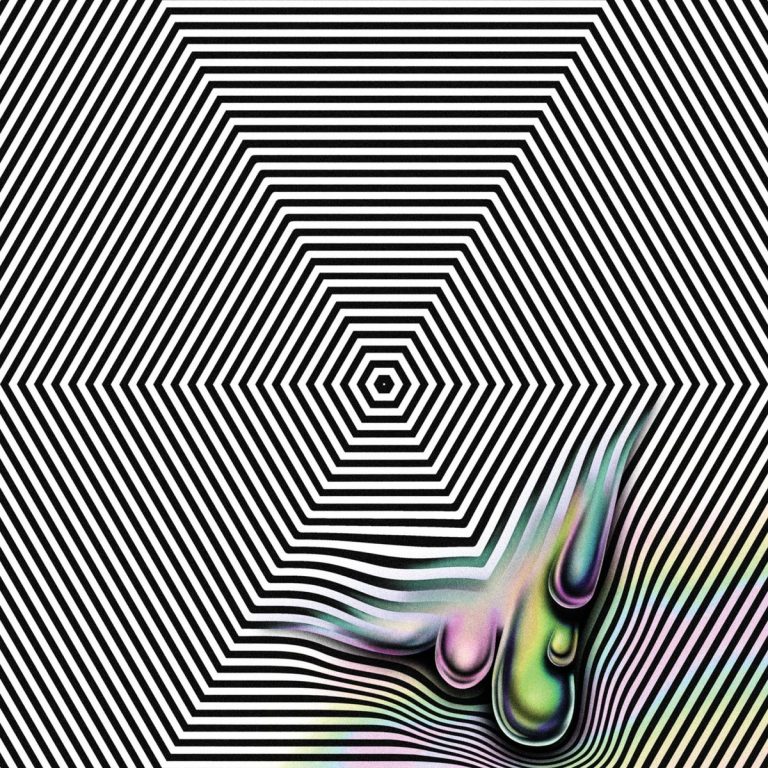Using the sounds of scrubbing between stations on a radio to make an album seem like one long transmission has been done by many artists, and it was only a matter of time before Daniel Lopatin gave it a try. His latest Oneohtrix Point Never album, Magic Oneohtrix Point Never, is named after the Boston’s Magic 106.7 and features many scavenged clips from radio stations and television channels, deformed and inserted to render that feeling of frequency surfing. They also handily stitch together what is the most divergent and disjointed Oneohtrix Point Never album yet.
In fact, Magic sounds more like an old cassette mixtape that was created by hitting ‘record’ at the right time when the desired song is played on the radio. It’s like the project of a teenager who’s just discovering their love for the broad world of sound and music, and wanting to capture as much of it as they can through their cherished cassette/radio boombox. In that way, it sounds like a remnant of the golden age of FM – albeit one that has been sitting in an attic for decades, getting warped and degraded. It’s clear that Lopatin has a lot of affection for that era and its aesthetic, and he welcomes us to Magic as if it’s a safe space away from the noise of the world; the first sung lines on the album being his friendly falsetto repetition of “I know a place to go.”
Ironically, this welcome on “Auto & Allo” also touches on one of the nagging feelings of Magic – that many of the sounds and styles, while still being undeniably and enjoyably OPN, are also a little familiar at this point. This is a problem mainly suffered by the non-vocal cuts like “Bow Ecco”, where the clicking and glistening minutiae of sounds still mesmerise, but don’t greatly surprise. “Tales From The Trash Stratum” seems like another re-tread, in that it’s a hyper-charged collage of textures, effects and samples of the kind we’ve hear from him plenty before, and its familiarity and formlessness again fail to ignite the imagination.
Lopatin’s idiosyncratic production flair is more successful elsewhere, with the stunning serenity of “Imago” being the most captivating non-vocal track on Magic. Here, an alien symphony of synthesized strings and flute come in caressing waves, intermittently degrading into static, as if the transmission has been corrupted on its long voyage through the cosmos. A similarly fuzzed-out bliss is implemented on “Wave Idea”, where swells of crackling synth – reminiscent of his earlier ambient work – are oddly jammed together with cuckoo samples.
Elsewhere, it’s the vocal tracks that offer the biggest departure for OPN, with ‘pop’ songs accounting for a significant chunk of the runtime. Album centrepiece “The Whether Channel” is a six-minute encapsulation of OPN’s output so far, unfolding in two parts. The first portion is again reminiscent of his earlier material, as it guides us through plinking tones, spectral synths and carefully-spliced dulcimer, revealing another of his gleaming visions of what New Age music might be if it were dusted off and re-cut for the modern day. However, “The Whether Channel” then morphs into something new for OPN, as Virginia rapper Nolanberollin floats in to deliver pitched-down bars where he takes up an odd character that appreciates the beautiful skyline, declares himself a raccoon, and delivers lines like “she gon’ get nutty for the cashew.” It’s probably the most extroverted moment on a Oneohtrix Point Never album yet – that it actually works speaks to the boundlessness of Magic.
This is true of the rest of his guest turns, which offer the more intriguing and exciting moments. It sounds as if he’s locked Caroline Polachek in an electromagnetic reverberation chamber on “The Long Road Home”, his distortion and effects not deteriorating the power of her tone as they duet on a lost drivetime classic. “Shifting” is a sub-two-minute experiment that places Arca’s intimidating growl and banshee falsetto behind pinwheeling arpeggios and disconcerting wails, capturing the chill of a horror classic.
With Lopatin having contributed some production to The Weeknd’s recent album After Hours, Abel Tesfaye returns the favour here as co-executive producer, the two musicians having had “very fruitful conversations” over the course of the album’s creation. Perhaps it should come as no surprise then that The Weeknd steals the show when he steps in on “No Nightmares”, adding his gossamer voice in an unexpected but undeniably great power ballad; the kind that impels you to clench your fist and sing from the heart as if you’re alone in the car or in front of the mirror.
When Lopatin sings alone the results are more variable. Despite its intriguing chiaroscuro of synth textures, “I Don’t Love Me” can’t escape sounding like a middle of the road rock dirge. The power-pop beat and melody of “Lost But Never Alone” frames his lonely robot mumblings interestingly, but it feels like an echo of the titanic “No Nightmares” that comes shortly before – although the guitar synth solo from Nate Boyce is absolutely searing and a stand-out moment on the record.
That Magic Oneohtrix Point Never has fewer outright startling moments on it than previous OPN records speaks to the small but undeniable impact he’s had on music in the last few years. We’ve become accustomed to hearing his production in Hollywood movies and chart-topping albums, so perhaps it’s now more difficult for him to produce moments that truly astonish. That being said, the album still comprises some truly enchanting touches that could only have come from him, and often they appear when working around a vocalist. These pop turns envision a world where radio hits have a bit more depth and experimentation, and if Lopatin’s output can continue to minutely steer mainstream music that way, then so much the better.

